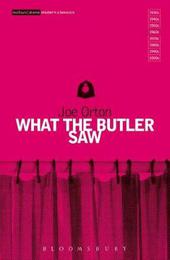
|
What The Butler Saw
Paperback / softback
Main Details
| Title |
What The Butler Saw
|
| Authors and Contributors |
By (author) Joe Orton
|
| Series | Modern Classics |
|---|
| Physical Properties |
| Format:Paperback / softback | | Pages:96 | | Dimensions(mm): Height 198,Width 129 |
|
| Category/Genre | Plays, playscripts |
|---|
| ISBN/Barcode |
9780413366801
|
| Classifications | Dewey:822.914 |
|---|
| Audience | |
|---|
| Edition |
Revised - Rev ed
|
|
Publishing Details |
| Publisher |
Bloomsbury Publishing PLC
|
| Imprint |
Methuen Drama
|
| Publication Date |
22 May 1969 |
| Publication Country |
United Kingdom
|
Description
"Joe Orton's last play, What the Butler Saw, will live to be accepted as a comedy classic of English literature" (Sunday Telegraph) The chase is on in this breakneck comedy of licensed insanity, from the moment when Dr Prentice, a psychoanalyst interviewing a prospective secretary, instructs her to undress. The plot of What the Butler Saw contains enough twists and turns, mishaps and changes of fortune, coincidences and lunatic logic to furnish three or four conventional comedies. But however the six characters in search of a plot lose the thread of the action - their wits or their clothes - their verbal self-possession never deserts them. Hailed as a modern comedy every bit as good as Wilde's The Importance of Being Earnest, Orton's play is regularly produced, read and studied. What the Butler Saw was Orton's final play. "He is the Oscar Wilde of Welfare State gentility" (Observer)
Author Biography
Joe Orton (1933-1967) was an English playwright noted for his black comedies, which combine genteel dialogue with violent and shocking action. Orton left home at 16 to train as an actor. His subversive style of humour first revealed itself in a bizarre incident in 1962, when he and his lover, Kenneth Halliwell were jailed for defacing library books. The two had carefully removed jacket blurbs from middle-brow novels and substituted their own, mostly scatological, counterfeits. Orton delighted in shocking audiences by breaking taboos surrounding sexuality and death in conventionally structured 'black' farces involving epigrammatic dialogue and frenetic, convoluted plots. Thus, in Entertaining Mr Sloane (1964), a young lodger attempts to lure a woman and her brother into providing him with all he needs, only to find he has become each one's sexual plaything; Loot (1965) is a parody of a detective story involving much comic business with a coffin and a corpse; and What the Butler Saw (1969) stylishly turns farce on its head. Orton was a homosexual in a period before the liberalization of British law, and this side of his life is described in detail in his posthumously published diaries. He was battered to death by Halliwell (who subsequently committed suicide) during a domestic argument at their home in Islington, North London.
|